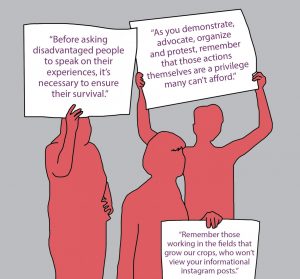What I’ve Learned About Debating From Among Us
October 28, 2020
Watching the nation’s presidential candidates spar on live television in a fast-paced forum that lends itself to vitriolic one-liners, I felt a curious sense of déjà vu. Of course, none of us are new to bitter political feuds, but when I opened my phone to check my messages and saw the red and yellow Among Us icon, I realized that this sense of familiarity was both sillier and closer to home.
If you haven’t played Among Us, you’ve probably seen it on Twitter. Players, represented by alien-like creatures on a spaceship, work collectively to fulfill tasks before the impostor is able to murder everyone, and when a body is found, the group votes on the killer (similar to mafia).
I have spent an embarrassing amount of time recently emptying tree leaves from an indoor garbage chute in outer space (because that makes sense). While the game is a fun escape, one can’t help but try to analyze some of the fascinating social dynamics of debating who the imposter is, often with complete strangers. These dynamics feel especially relevant during a bitter election season.
In a world of “sus,” it pays to be sure of yourself.
What makes an argument convincing enough to rally someone who has no personal involvement in the situation? How do you attempt to build credibility with people you’ve never met when they know it’s entirely possible that you are lying? How do you say the most with the fewest words when time is of the essence? These might be the very same questions that your favorite (and least favorite) politicians ask themselves all the time.
I am no expert in Among Us and certainly no expert in debating, but during my stint as an amateur gamer, I have made the following observations on the art of persuasion. (Alexandria Ocasio-Cortez, if you’re reading this, I am unemployed and a huge fan.)
Confidence Is Convincing
I am certainly not the first to say that confidence helps, but the value of a clear and definitive statement becomes especially important in a setting like Among Us where there is limited time for discussion. The more times you choose to skip the vote, the closer you come to collective ruin, so players are quick to grasp at any sort of straw. I have seen people get away with blatant lies simply by being assertive.
Similarly, voters gravitate toward politicians who make unwavering statements and unequivocal promises, even when they cannot possibly be trusted to make good on those promises. Lying with confidence on the debate stage is a calculated risk, one that is unfortunately often worth it for politicians. Not everyone meticulously reads the fact checks the next day, and there is little time allowed to list concrete evidence even if it existed, so the tone and presentation is what ultimately counts.
In a world of “sus,” it pays to be sure of yourself.
Put Your Energy Into Listening
In the Among Us universe, the pre-voting conversation moves quickly, and people chat in sentence fragments and half-formed thoughts. While typing (on the mobile version, at least), you aren’t able to see the chat, so the longer you spend formulating a message, the more developments you miss. The rest of the group might have decided to vote you out by the time you see what they’ve said. Despite the time crunch, it usually pays to listen to what the other players are saying before you decide if, when and how to chime in.
During a debate, there isn’t an option to stay completely silent, but listening is still important. Assuming that candidates do a lot of preparation prior to debating, they shouldn’t have to worry too much about what their own responses will be, which ideally gives them the freedom to put all of their energy into listening to what their opponents are saying. Not only is it respectful, but it also allows candidates to pick up on their opponents’ inconsistencies and fallacies and to respond directly to what they’ve said. The 2020 presidential candidates were able to respond to each other’s comments more coherently when they weren’t rudely cutting in as often.
You Get What You Give
Humans are wired to mirror behavior, and it’s often a sign of rapport. On the flip side and as we see in many a debate, humans will also meet fire with fire as conflict escalates. The best way to not get insulted is to refrain from being insulting yourself.
This has become even clearer through playing Among Us. From what I can tell, people tend to toe the line between genuine malice and tongue-in-cheek jabs made in the spirit of good fun, but regardless of intent, when players attack each other in the chat, it’s often very targeted. A situation will escalate between a specific few people who egg each other on.
It goes without saying that the stakes are much lower in a video game than a debate leading up to a presidential election, but it’s still interesting to compare. A conversation will start focused on the details of an impostor murder or a specific policy area, and what begins as a legitimate topical disagreement will then devolve into a personal feud, as we’ve seen in the most recent presidential candidate debates.
Naturally, this makes for an unproductive discussion, albeit good television. (In Among Us, too, it’s entertaining to watch, but ends up overshadowing the actual goal.) For this reason, candidates need to understand how difficult it is to say a single inflammatory thing and leave it at that, without consequently derailing the entire conversation.
It’s probably not a good thing that an intergalactic digital mafia game has colored my perception of national politics to this extent, but as political debates and the rhetoric of the political sphere have become increasingly outlandish, I am clearly willing to go to great lengths in an attempt to make some sense of it all.
Who knows, maybe some of these reflections on argumentation will come in handy at the Thanksgiving table, and if not, I’ll be in my room diverting power to the lower engine.
















